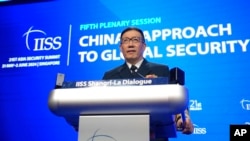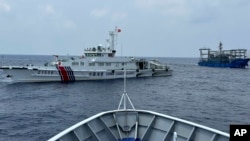China hardened its position on contentious security issues in the Indo-Pacific region at the Shangri-La Dialogue in Singapore last weekend, as Chinese Defense Minister Dong Jun criticized some external forces for offering military support to Taiwan while accusing the Philippines of endangering stability in the South China Sea.
While Dong said Beijing had exercised constraint in response to what it described as “infringements and provocations” carried out by a certain country, without directly naming the Philippines, delegates from some countries say his speech was “full of veiled threats.”
“There were a number of threats to the region in his speech, including warning that ‘Taiwan separatists’ would be nailed to the pillar of shame in history and that countries interfering with Beijing’s efforts to reunify with Taiwan would face self-destruction,” said Jennifer Parker, a defense expert at the Australian National University and a delegate at the Shangri-La Dialogue.
In addition to threats about Taiwan, Parker said Dong’s speech also reflects Beijing’s disregard for the Philippines’ agency in the two countries’ ongoing territorial dispute in the South China Sea. “There was a clear level of disrespect towards the Philippines [in Dong’s speech,]” she told VOA by phone.
During his 40-minute-long keynote address, Dong accused some external forces, an indirect mention of the United States, of “undermining” the centrality of the Association of Southeast Asian Nations (ASEAN) and bringing “unstable factors to regional peace and development.”
Some Shangri-La delegates from the Philippines said some Southeast Asian countries view China’s attempt to “speak on behalf of ASEAN” as a “blatant attempt to hijack ASEAN.”
“China’s use of ‘ASEAN centrality’ argument rings hollow because it is not a member of ASEAN but it also claims to speak on behalf of ASEAN,” Justin Baquisal, a Manila-based geopolitical analyst and a delegate at the Shangri-La Dialogue, told VOA in a written response.
During the question-and-answer session of his speech, Dong refused to address questions about China’s stance on the war in Ukraine and spent almost 10 minutes reiterating Beijing’s warning toward Taiwan’s new government under President Lai Ching-te, whom the Chinese government views as a separatist.
Parker in Australia said while previous Chinese defense ministers tried to ensure their speeches resonated to some level with the audience during Shangri-La Dialogues, Dong Jun didn’t seem to care how his speech was received. “I interpret the message from his speech as ‘we don’t care about what you think,’” she told VOA.
Washington’s commitment to regional partnership
Compared to the blunt warning reflected in Dong’s speech, some analysts say United States Secretary of Defense Lloyd Austin’s keynote speech at the Shangri-La Dialogue was well-received by representatives from several countries.
During his 30-minute address, Austin said like-minded countries across the Indo-Pacific region have deepened engagements and delivered results that benefited people over the last three years.
“A new model of convergence in this region is not a single alliance or coalition, [but] a set of overlapping and complementary initiatives and institutions, propelled by both a shared vision and a shared sense of mutual obligation,” he told a room of hundreds of international delegates.
He highlighted 13 different agreements or initiatives Washington has rolled out with allies in the region, including South Korea, Japan, the Philippines, and India, while emphasizing that the U.S. is “deeply committed to the Indo-Pacific.”
“The United States and this region are more secure and more prosperous when we work together,” Austin said, adding that Washington is “all in” and “not going anywhere.”
Parker says the focus on partnership in Austin’s speech is viewed positively by some countries in the Indo-Pacific region, including traditional allies like Japan and Australia.
“Australia featured heavily in the speech, both through referencing to Richard Marles and through referencing of our partnership several times,” she told VOA, adding that Austin’s speech would play well with other allies such as Japan, South Korea, and the Philippines.
While the U.S. Defense Secretary reaffirmed Washington’s support for Manila, Baquisal thinks his speech was “too plain to please anybody.”
His speech "was too weak to deter China, who was notably more bellicose toward the Philippines in its language during the Shangri-La Dialogue, and too strong for the comfort of some Southeast Asian states in attendance, who prefer that both the U.S. and China not go into a war of words in the summit,” he told VOA.
Security environment in Indo-Pacific may deteriorate
Despite Washington and Beijing’s attempt to de-escalate tension between them through the talks between Austin and Dong, some regional analysts say their respective speeches show the two superpowers still hold “very different views.”
Dong and Austin "met but didn’t have a meaningful dialogue, [so] other countries will have to accept that the U.S.-China rivalry is a long-term trend and they need to figure out how to navigate in this environment,” Bich Tran, a postdoctoral fellow at Lee Kuan Yew School of Public Policy in Singapore and a Shangri-La Dialogue delegate, told VOA in a written response.
Parker from Australia said there are no signs that tensions in the Indo-Pacific region are easing following an eventful weekend in Singapore. “I didn’t get any sentiment from Dong’s speech that China is keen to resolve any of these issues, [and] I think the current trajectory in the region will continue,” she told VOA.
In her view, the security environment in the Indo-Pacific region will “continue to deteriorate” in the near future, judging from the recent Chinese military exercise around Taiwan and Beijing’s sharp language towards the Philippines.
“It’ll be difficult for regional countries who are economically dependent on China to [adjust to this dynamic,]” Parker said.





